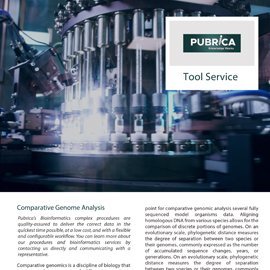Tool Service
Pubrica’s Bioinformatics complex procedures are quality-assured to deliver the correct data in the quickest time possible, at a low cost, and with a flexible and configurable workflow. You can learn more about our procedures and bioinformatics services by contacting us directly and communicating with a representative.
The integration of computation and analysis tools to the capture and interpretation of biological data. Bioinformatics tools aid in evaluating, analyzing, and interpreting genetic and genomic data and comprehending molecular biology's evolutionary aspects in general. Multi-functional analysis procedures are available, as well as simple command-line tools and web applications. It aids in analyzing and cataloguing biological pathways and networks that are essential parts of systems biology on a more integrated level. A web-based tool for integrating bioinformatics information resources has been created and implemented. We analyzed data that is simple to configure and adjust based on the study design.
Our comprehensive Bioinformatics Tool services
Types of Bioinformatics Tools Services: We undertake different types of Bioinformatics tools for Active site prediction, Comparative Genome Analysis, Chemical property identification & ADME Property, Protein Structure Prediction, Restriction site Analysis for your research work.
Wide range of Sources: NCBI, BLAST, Pubmed, Pubmed Nucleotide, Pubmed Protein, Pubmed Gene, Pubmed Sequence.
let experts propel your research forward.
We’ll scale
up as your needs grow.
No compromising on integrity and quality. Our processes are well defined and flexible to ramp up as per your requirements.
Partnering with
you till the project end.
We come with you all the way. From design to market support

Pubrica Offerings
Pubrica provides comprehensive bioinformatics research work publishing assistance for various publications, journals, and books. With our writing services, you can now turn your ideas into Project writing, Proposal writing, Research Writing, Thesis writing and Manuscript writing. Science, Technology, Engineering, and Mathematics (STEM) experts with a therapeutic background. It is now simple to publish a research work or obtain regulatory drug approval. With Pubrica's help, you can save time and money.
Frequently asked questions
We are with you the whole nine yards. In this section, we answer the tough questions. For any information, contact us via +91-9884350006 meanwhile, here are some of those queries
Solve an issue with computational modeling. A bioinformatics solution frequently included in the following steps is: Compile statistical information from biological data. Essentially generate a computational model. A computing algorithm is sorely tested and evaluated.
Bioinformatics has benefited evolutionary study by allowing researchers to compare DNA sequences, exchange information, anticipate potential evolution, and classify complex evolutionary processes. Overall, bioinformatics has opened up a world of possibilities in genomics and targeted gene therapy.
We make sure the safety and protection of your data. We are enthusiastic about signing a non-disclosure agreement (NDA if need be to ensure the security of your data).
Disease-specific research, topic selection, target identification, ligand discovery, cost-effectiveness research, and resource utilization have all been aspects we're researching into. Additional information on how to choose a detailed study area plan can be found at https://pubrica.com/services/bioinformatics/
The Bioinformatics pathway focuses on three study areas: computational biology and bioinformatics; Genetics and genomics are often used interchangeably and system biology.
Bioinformatics has benefited evolutionary study by allowing researchers to compare DNA sequences, communicate information, forecast future evolution, and classify complex evolutionary processes.


